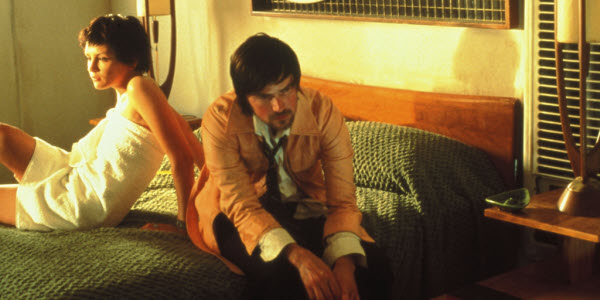29 Palms (2002) 
“Money, murder, betrayal. It’s all in the bag.”

Director: Leonardo Ricagni
Cast: Jeremy Davies, Chris O’Donnell, Rachael Leigh Cook
Synopsis: This is the story of a bag of money and the people who come into contact with it.
Cool is a difficult concept; it’s something that, by its very nature, is unattainable because if you’re having to make an effort to achieve it then you obviously haven’t got it in the first place. Quentin Tarantino’s a geek, but he’s cool when it comes to translating his ideas onto the big screen, and that’s fine — the only problem is, people see a cool concept, they all try to copy it, and they invariably screw up. That’s not to say some don’t come close, though…
Uruguayan advertisement director Leonardo Ricagni cuts his English-language directorial teeth on the low budget heist flick 29 Palms and finds himself with a rather choice cast to work with: Rachel Leigh Cook, Jeremy Davies, Chris O’Donnell, Jon Polito, Michael Rapaport (who also co-produced) and Bill Pullman. Ricagni fills the screen with the kind of gimmickry that dazzles in the same way that a bright light in your eyes dazzles, but injects a kinetic energy into the maze-like plot that at least ensures the viewer isn’t bored — even if s/he is occasionally irritated.
Jeremy Davies plays a Judge’s clerk mistakenly believed by his crooked boss to be an FBI undercover agent. The judge is in cahoots with an Indian casino boss with expansion plans, and convinces the chief to hire a hit-man to off the hapless clerk. The clerk makes a run for it after witnessing the murder of his wife by the chief’s, erm, chief warrior, and heads into the desert, eventually winding up in the desert town of 29 Palms. Meanwhile, the hit-man (O’Donnell) has his blood money stolen by a sleazy security guard (Polito). Further plot twists result in a crooked cop (Rapaport) and a sleazy bus station attendant (Pullman) also getting in on the act.
The story mostly takes place in the desert and has very little in the way of action set-pieces — a sure sign of a minuscule budget (although one that bloated to nearly three times its intended value), but also offers little in the way of characterisation to conceal the fact. Many of the characters are genre stereotypes, and some seem to exist only to offer screenwriter Tino Lucente a further series of twists to add to a story that becomes a little too convoluted at times. Despite this, I liked 29 Palms for most of its running time: the story zips along, it has a lot of energy and not a little style, and contains some agreeably quirky performances, but sadly it also has a director too keen to make an impression, chaotic editing, and relies far too heavily on unbelievable coincidences which severely strain credulity even when you are willing to give it every chance.
Perhaps underlining his apparent unpopularity on the set, Jeremy Davies wanders through the entire picture as if he has overdosed on prozac, and fails to inject any kind of personality into the character of the drifter (none of the characters in the movie are named) at the centre of the storyline, or develop any kind of chemistry with Leigh-Cook’s waitress. At least the other characters have a little more life to them. Rapaport is exceptionally sleazy in the role of a crooked cop, warning Davies, “Don’t you resist me. I like men, I like women, I like ’em all. I’m avant-garde like that.”; Chris O’Donnell is surprisingly effective as the suave hit-man ( a role originally intended for Gabriel Byrne), and Coen Brothers’ regular Jon Polito is as reliable as ever in the comic relief role of a lecherous low-life security guard.
29 Palms won’t make anybody’s top ten list and contains considerable flaws, but if the viewer enters into the knockabout spirit of the thing and accepts that there’s no award winning stuff on offer, they will at least be entertained for the length of its fast-moving, relatively brief running time.
httpv://www.youtube.com/watch?v=dkpMExfmT9w
